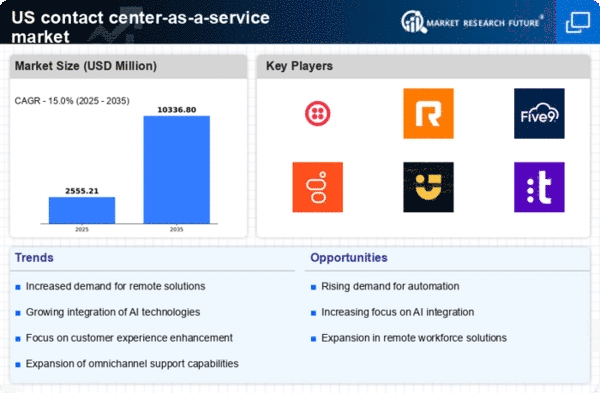The US Contact Center as a Service Market is characterized by a rapidly evolving landscape driven by technological advancements and changing consumer expectations. With businesses increasingly integrating cloud-based solutions to enhance customer engagement, a multitude of providers are competing fiercely to establish their presence in this growing sector. Companies are focusing on delivering innovative solutions that improve operational efficiency, enable seamless integration with existing systems, and provide superior customer experiences. The competitive dynamics are shaped by factors such as pricing strategies, service offerings, scalability, and the ability to adapt to evolving market trends.
As organizations prioritize remote working capabilities and omnichannel communication strategies, analyzing the competitive landscape becomes crucial for identifying opportunities and risks in this market.
Talkdesk has positioned itself as a formidable player in the US Contact Center as a Service Market, focusing on delivering a user-friendly platform that enhances customer service experiences. The company boasts a strong market presence, having established numerous partnerships and integrations that streamline various customer interaction channels. Talkdesk emphasizes its strengths in ease of use, rapid deployment, and robust analytics capabilities, making it a preferred choice for businesses seeking to enhance their customer support operations. The provider's commitment to innovation is evident in its continuous introduction of new features designed to empower agents and optimize call center performance.
This focus on user experience and efficiency helps maintain its competitive edge, allowing Talkdesk to capture significant market share within the US.Avaya operates as another significant entity within the US Contact Center as a Service Market, recognized for its comprehensive solutions tailored to enhance customer interactions and workforce engagement. The company offers a suite of products, including advanced analytics, AI-driven customer service solutions, and omnichannel capabilities that address the diverse needs of contact centers.
Avaya's strong market presence is bolstered by strategic mergers and acquisitions that have expanded its technological capabilities and customer base. The company's focus on innovation enables it to deliver solutions that not only meet client expectations but also foster long-term customer relationships. With a robust portfolio aimed at enhancing service delivery and operational efficiency, Avaya continues to leverage its strength in developing customizable solutions, thereby solidifying its role within the competitive landscape of the US market.























Leave a Comment